
Public Finance Quarterly-Hungary
Scope & Guideline
Connecting Theory and Practice in Fiscal Management
Introduction
Aims and Scopes
- Public Finance and Economic Policy:
The journal emphasizes the role of public finance in shaping economic policies, including taxation, budgeting, and public expenditure management. - Behavioral Economics and Finance:
A significant portion of the journal's contributions explore behavioral aspects of finance, including decision-making processes and psychological influences on economic behavior. - Sustainability and Environmental Economics:
The journal addresses sustainable economic practices, examining how public finance can support environmental sustainability, green transitions, and sustainable development goals. - Financial Systems and Institutional Analysis:
The journal investigates the structures and functions of financial systems, including banking, investment, and compliance mechanisms, particularly in the context of Hungary and Central Eastern Europe. - Economic Inequality and Social Justice:
There is a consistent focus on understanding economic inequalities and proposing policies aimed at social equity, informed by historical and theoretical perspectives.
Trending and Emerging
- Behavioral Macroeconomics:
An increasing number of papers delve into behavioral macroeconomics, focusing on psychological factors influencing inflation expectations and economic decision-making. - Sustainable Finance and Economic Growth:
Themes surrounding sustainable finance, including the financing of green projects and sustainable economic growth strategies, are gaining prominence as global sustainability efforts intensify. - Digital Transformation in Finance:
There is a noticeable rise in discussions about digital transformation, particularly the implications of central bank digital currencies and fintech innovations on public finance. - Economic Inequality and Social Policies:
Research addressing economic inequality and the development of meritocratic economic policies aimed at benefiting the middle class has become increasingly relevant. - Impact of Financial Markets on Investment Decisions:
Recent studies are increasingly analyzing how financial market dynamics distort investment decisions, highlighting the interplay between finance and economic policy.
Declining or Waning
- Cryptocurrency and Digital Finance:
Although initially a hot topic, the frequency of publications related to cryptocurrencies and digital finance has decreased, possibly due to market stabilization and regulatory developments. - Impact of COVID-19 on Financial Markets:
Research specifically focused on the immediate effects of the COVID-19 pandemic on financial markets is waning as the global economy adapts and moves towards recovery. - Traditional Tax Policy Analysis:
There is a noticeable reduction in studies dedicated to conventional tax policies, as newer themes related to sustainability and behavioral economics gain traction. - Global Economic Comparisons:
Papers comparing Hungary's economic situation with broader global trends have become less frequent, suggesting a shift towards more localized analyses. - Historical Economic Analysis:
Research that emphasizes historical economic trends without direct implications for current policy is becoming less common, as the journal prioritizes contemporary issues.
Similar Journals

Annual Review of Financial Economics
Illuminating the Interplay of Economic TheoriesAnnual Review of Financial Economics, published by Annual Reviews, stands as a pivotal journal in the fields of Economics and Finance, recognized for its rigorous analysis and comprehensive reviews since its inception in 2010. With an impressive impact factor reflected in its Q1 ranking in both Economics and Econometrics and Finance for 2023, this journal serves as an essential resource for researchers, professionals, and students keen on understanding the dynamic interplay of financial theories and practices. The ISSN 1941-1367 and E-ISSN 1941-1375 signal its commitment to accessibility and dissemination of cutting-edge research within the community. Addressing crucial topics from market behavior to economic modeling, each annual volume synthesizes the latest findings and theoretical advancements, thus contributing significantly to the global discourse within financial economics. With its high Scopus rankings, including a finance rank of #75 out of 317, the journal continues to foster a deep understanding of financial systems and their implications, serving as an invaluable tool for anyone engaged in the broader economic landscape.
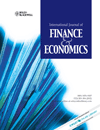
INTERNATIONAL JOURNAL OF FINANCE & ECONOMICS
Pioneering Theories for Tomorrow's EconomistsInternational Journal of Finance & Economics, published by Wiley, is a premier academic journal that serves as a vital resource for researchers and professionals in the fields of finance, accounting, and economics. With an impressive impact factor and a reputation for excellence, the journal is recognized in the 2023 Scopus rankings, placing in the top quartiles across multiple categories, including Q2 in Accounting, Economics, and Finance. The journal has been a significant contributor to academic discourse since its inception in 1996, with its converged years extending to 2024, thereby ensuring the continuous advancement of knowledge in these critical areas. Although it operates under a traditional subscription model, its comprehensive articles provide insightful analyses, empirical research, and theoretical advancements that cater to a diverse audience—from seasoned scholars to emerging students in the field.
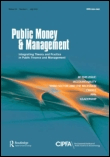
PUBLIC MONEY & MANAGEMENT
Championing excellence in public finance and management studies.PUBLIC MONEY & MANAGEMENT is a leading academic journal dedicated to advancing knowledge and understanding in the realms of public finance, management, and policy. Published by Routledge Journals, Taylor & Francis Ltd, this journal holds a significant position within the academic community, with its impact reflected in its Q2 category rankings across several fields, including Accounting, Business Management, Finance, and Public Administration, as well as a prestigious Q1 ranking in Sociology and Political Science for 2023. Established in 1988 and continuing through 2024, PUBLIC MONEY & MANAGEMENT provides a platform for scholars and practitioners to share insights, research findings, and methodologies that influence the public sector. Though it does not currently offer Open Access options, the journal is committed to promoting rigorous research and innovative practices, making it an invaluable resource for researchers, professionals, and students alike. With its strong Scopus rankings and an enduring legacy in public administration scholarship, this journal plays a pivotal role in shaping fiscal policy and management practices on a global scale.

Financial and Credit Activity-Problems of Theory and Practice
Unveiling Insights into Accounting and Economic PracticesFinancial and Credit Activity-Problems of Theory and Practice is an esteemed academic journal published by FINTECHALIANCE, specializing in the multifaceted realms of accounting, business, economics, and finance. Since its inception in 2017, this Open Access journal has committed to disseminating vital research that addresses both theoretical frameworks and practical issues within these fields, making it an invaluable resource for researchers, professionals, and students alike. With its ISSN 2306-4994 and E-ISSN 2310-8770, the journal aims to foster a robust dialogue among stakeholders, contributing to the advancement of knowledge and innovative practices in financial and credit activities. Notably positioned in the Q4 Quartile across several categories, including Accounting and Finance, the journal continues to strive for improvement, fostering future growth within the academic community. Situated in Kyiv, Ukraine, this journal stands as a beacon for advancing scholarly discourse and enhancing practical understanding in its targeted fields.
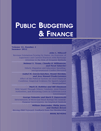
Public Budgeting and Finance
Advancing Knowledge in Public AdministrationPublic Budgeting and Finance is a distinguished journal published by WILEY, encompassing pivotal research in the fields of public administration, economics, and finance. With an impressive track record of publications dating back to 1981, this journal plays a crucial role in informing and shaping public policy and fiscal management practices. It operates without open access, ensuring a selective and highly curated set of research that maintains rigorous academic standards. The journal consistently ranks in the second quartile (Q2) across its categories, highlighting its relevance and influence within the academic community. With Scopus rankings placing it in the 45th percentile for Public Administration and Finance, it serves as an essential resource for researchers, practitioners, and students aiming to enhance their understanding of budgeting processes and fiscal governance in both theory and practice. The journal is a go-to source for innovative approaches and evidence-based practices that address contemporary challenges in public finance, making it indispensable for anyone seeking to contribute meaningfully to this vital field.
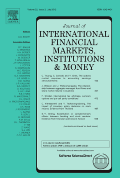
Journal of International Financial Markets Institutions & Money
Pioneering Research at the Intersection of Economics and FinanceThe Journal of International Financial Markets, Institutions & Money, published by Elsevier, serves as a leading platform for the dissemination of high-quality research in the fields of finance, economics, and econometrics. With an impressive impact factor reflected in its status as a Q1 journal in both categories for 2023, it ranks among the top journals, positioned at #47 out of 317 in Finance and #111 out of 716 in Economics. This journal offers a unique focus on the interplay between financial markets and institutions on a global scale, making it an essential resource for scholars, practitioners, and students alike. The journal welcomes innovative theoretical, empirical, and applied research, contributing to an exciting dialogue that shapes the future of international finance. For researchers looking to publish their findings, this journal is committed to rigorously engaging with contemporary financial phenomena, positioning itself as a vital cornerstone of academic and professional discourse.
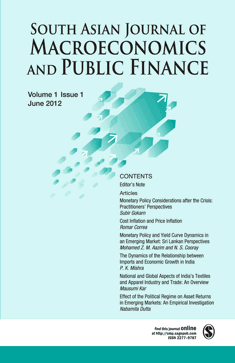
South Asian Journal of Macroeconomics and Public Finance
Exploring Innovative Solutions for Economic ChallengesSouth Asian Journal of Macroeconomics and Public Finance (ISSN: 2277-9787, E-ISSN: 2321-0273) is a distinguished academic journal published by SAGE Publications India Pvt Ltd. Operating from the United Kingdom, this journal serves as a vital platform for researchers and professionals in the fields of macroeconomics and public finance, with a commitment to advancing the understanding of these disciplines across South Asia and beyond. With a Q3 ranking in both Economics and Econometrics and Finance as of 2023, it positions itself as a relevant contributor to ongoing discussions and developments, offering insights supported by its Scopus rankings, where it is placed in the 44th and 41st percentiles in Finance and Economics respectively. The journal spans converged years from 2012 to 2024, fostering a collaborative space for cutting-edge research and rigorous analysis. This journal is essential for scholars seeking to engage with contemporary economic challenges and policy implications, paving the way for innovative solutions and informed decision-making.

Annals of Economics and Finance
Empowering Economic Insights, Shaping Financial Futures.Annals of Economics and Finance is an esteemed academic journal published by Wuhan University Journals Press, focusing on the fields of Economics and Finance. Established in 2000, this journal serves as a platform for scholars to disseminate their research findings and insights, contributing to the development of these disciplines through rigorous peer-reviewed articles. Despite currently holding a Q4 ranking in both Economics and Econometrics and Finance categories (2023), it strives to enhance its impact on the academic community and policy-making audiences. While not Open Access, the journal seeks to cultivate a deeper understanding of vital economic theories and financial practices, thereby offering invaluable resources for researchers, professionals, and students alike. With its broad scope, the Annals of Economics and Finance is poised to play a crucial role in shaping contemporary economic discourse up to 2024 and beyond.
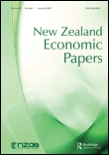
New Zealand Economic Papers
Exploring the dynamics of New Zealand's economy through rigorous research.New Zealand Economic Papers is a prominent academic journal dedicated to the field of economics, published by Taylor & Francis Ltd. With its ISSN 0077-9954 and E-ISSN 1943-4863, this journal has been a significant contributor to economic discourse since its inception in 1966, continuing to provide valuable insights through to 2024. As part of the third quartile (Q3) in the Economics, Econometrics and Finance category, it ranks at #165 out of 288 in Scopus, placing it within the 42nd percentile, demonstrating its respectable impact in the academic community. Although the journal does not offer open access, it remains a vital resource for researchers, professionals, and students interested in understanding economic dynamics, policy analysis, and applied econometrics, particularly in the context of New Zealand. The journal's commitment to rigorous research ensures that it continues to play a crucial role in shaping economic policy and academic thought across the globe.
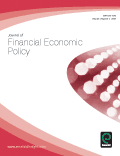
Journal of Financial Economic Policy
Illuminating critical issues in finance and economic policy.Journal of Financial Economic Policy is a premier academic journal published by EMERALD GROUP PUBLISHING LTD, focusing on the intersection of finance and economics. Through rigorous peer-reviewed research, the journal aims to advance understanding of financial policies and economic frameworks, addressing critical issues faced by financial markets and institutions. With an ISSN of 1757-6385 and an E-ISSN of 1757-6393, it serves as a reputable source of information for researchers, professionals, and students alike. The journal operates within the United Kingdom and is recognized for its contributions to the fields of economics and finance, achieving a Q3 category ranking in both disciplines as per the 2023 metrics. This places it within the top half of journals in its category according to Scopus ranks, demonstrating a solid impact in the academic community. Although it is not an open-access journal, the insights and analyses published are invaluable for those seeking to grasp complex financial phenomena and develop effective policies. The journal’s scope encompasses a wide range of topics relevant to contemporary finance and economic strategies, making it an essential resource for ongoing scholarly discourse and practical applications.